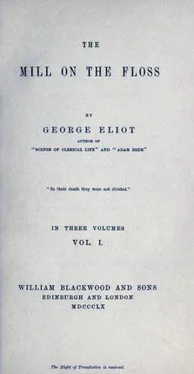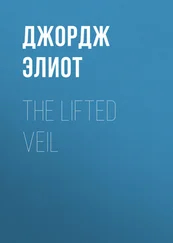"Oh dear, oh dear," said Mrs. Tulliver, "to think o' my chany being sold i' that way, and I bought it when I was married, just as you did yours, Jane and Sophy; and I know you didn't like mine, because o' the sprig, but I was fond of it; and there's never been a bit broke, for I've washed it myself; and there's the tulips on the cups, and the roses, as anybody might go and look at 'em for pleasure. You wouldn't like your chany to go for an old song and be broke to pieces, though yours has got no color in it, Jane, — it's all white and fluted, and didn't cost so much as mine. And there's the castors, sister Deane, I can't think but you'd like to have the castors, for I've heard you say they're pretty."
"Well, I've no objection to buy some of the best things," said Mrs. Deane, rather loftily; "we can do with extra things in our house."
"Best things!" exclaimed Mrs. Glegg, with severity, which had gathered intensity from her long silence. "It drives me past patience to hear you all talking o' best things, and buying in this, that, and the other, such as silver and chany. You must bring your mind to your circumstances, Bessy, and not be thinking o' silver and chany; but whether you shall get so much as a flock-bed to lie on, and a blanket to cover you, and a stool to sit on. You must remember, if you get 'em, it'll be because your friends have bought 'em for you, for you're dependent upon them for everything; for your husband lies there helpless, and hasn't got a penny i' the world to call his own. And it's for your own good I say this, for it's right you should feel what your state is, and what disgrace your husband's brought on your own family, as you've got to look to for everything, and be humble in your mind."
Mrs. Glegg paused, for speaking with much energy for the good of others is naturally exhausting.
Mrs. Tulliver, always borne down by the family predominance of sister Jane, who had made her wear the yoke of a younger sister in very tender years, said pleadingly:
"I'm sure, sister, I've never asked anybody to do anything, only buy things as it 'ud be a pleasure to 'em to have, so as they mightn't go and be spoiled i' strange houses. I never asked anybody to buy the things in for me and my children; though there's the linen I spun, and I thought when Tom was born, — I thought one o' the first things when he was lying i' the cradle, as all the things I'd bought wi' my own money, and been so careful of, 'ud go to him. But I've said nothing as I wanted my sisters to pay their money for me. What my husband has done for his sister's unknown, and we should ha' been better off this day if it hadn't been as he's lent money and never asked for it again."
"Come, come," said Mr. Glegg, kindly, "don't let us make things too dark. What's done can't be undone. We shall make a shift among us to buy what's sufficient for you; though, as Mrs. G. says, they must be useful, plain things. We mustn't be thinking o' what's unnecessary. A table, and a chair or two, and kitchen things, and a good bed, and such-like. Why, I've seen the day when I shouldn't ha' known myself if I'd lain on sacking i'stead o' the floor. We get a deal o' useless things about us, only because we've got the money to spend."
"Mr. Glegg," said Mrs. G., "if you'll be kind enough to let me speak, i'stead o' taking the words out o' my mouth, — I was going to say, Bessy, as it's fine talking for you to say as you've never asked us to buy anything for you; let me tell you, you ought to have asked us. Pray, how are you to be purvided for, if your own family don't help you? You must go to the parish, if they didn't. And you ought to know that, and keep it in mind, and ask us humble to do what we can for you, i'stead o' saying, and making a boast, as you've never asked us for anything."
"You talked o' the Mosses, and what Mr. Tulliver's done for 'em," said uncle Pullet, who became unusually suggestive where advances of money were concerned. "Haven't they been anear you? They ought to do something as well as other folks; and if he's lent 'em money, they ought to be made to pay it back."
"Yes, to be sure," said Mrs. Deane; "I've been thinking so. How is it Mr. and Mrs. Moss aren't here to meet us? It is but right they should do their share."
"Oh, dear!" said Mrs. Tulliver, "I never sent 'em word about Mr. Tulliver, and they live so back'ard among the lanes at Basset, they niver hear anything only when Mr. Moss comes to market. But I niver gave 'em a thought. I wonder Maggie didn't, though, for she was allays so fond of her aunt Moss."
"Why don't your children come in, Bessy?" said Mrs. Pullet, at the mention of Maggie. "They should hear what their aunts and uncles have got to say; and Maggie, — when it's me as have paid for half her schooling, she ought to think more of her aunt Pullet than of aunt Moss. I may go off sudden when I get home to-day; there's no telling."
"If I'd had my way," said Mrs. Glegg, "the children 'ud ha' been in the room from the first. It's time they knew who they've to look to, and it's right as somebody should talk to 'em, and let 'em know their condition i' life, and what they're come down to, and make 'em feel as they've got to suffer for their father's faults."
"Well, I'll go and fetch 'em, sister," said Mrs. Tulliver, resignedly. She was quite crushed now, and thought of the treasures in the storeroom with no other feeling than blank despair.
She went upstairs to fetch Tom and Maggie, who were both in their father's room, and was on her way down again, when the sight of the storeroom door suggested a new thought to her. She went toward it, and left the children to go down by themselves.
The aunts and uncles appeared to have been in warm discussion when the brother and sister entered, — both with shrinking reluctance; for though Tom, with a practical sagacity which had been roused into activity by the strong stimulus of the new emotions he had undergone since yesterday, had been turning over in his mind a plan which he meant to propose to one of his aunts or uncles, he felt by no means amicably toward them, and dreaded meeting them all at once as he would have dreaded a large dose of concentrated physic, which was but just endurable in small draughts. As for Maggie, she was peculiarly depressed this morning; she had been called up, after brief rest, at three o'clock, and had that strange dreamy weariness which comes from watching in a sick-room through the chill hours of early twilight and breaking day, — in which the outside day-light life seems to have no importance, and to be a mere margin to the hours in the darkened chamber. Their entrance interrupted the conversation. The shaking of hands was a melancholy and silent ceremony, till uncle Pullet observed, as Tom approached him:
"Well, young sir, we've been talking as we should want your pen and ink; you can write rarely now, after all your schooling, I should think."
"Ay, ay," said uncle Glegg, with admonition which he meant to be kind, "we must look to see the good of all this schooling, as your father's sunk so much money in, now,–
'When land is gone and money's spent,
Then learning is most excellent.'
Now's the time, Tom, to let us see the good o' your learning. Let us see whether you can do better than I can, as have made my fortin without it. But I began wi' doing with little, you see; I could live on a basin o' porridge and a crust o' bread-and-cheese. But I doubt high living and high learning 'ull make it harder for you, young man, nor it was for me."
"But he must do it," interposed aunt Glegg, energetically, "whether it's hard or no. He hasn't got to consider what's hard; he must consider as he isn't to trusten to his friends to keep him in idleness and luxury; he's got to bear the fruits of his father's misconduct, and bring his mind to fare hard and to work hard. And he must be humble and grateful to his aunts and uncles for what they're doing for his mother and father, as must be turned out into the streets and go to the workhouse if they didn't help 'em. And his sister, too," continued Mrs. Glegg, looking severely at Maggie, who had sat down on the sofa by her aunt Deane, drawn to her by the sense that she was Lucy's mother, "she must make up her mind to be humble and work; for there'll be no servants to wait on her any more, — she must remember that. She must do the work o' the house, and she must respect and love her aunts as have done so much for her, and saved their money to leave to their nepheys and nieces."
Читать дальше












